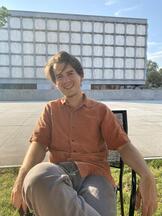Oliver Lucier
History of Climate Science; Global Environmental History; History of Ecology; History of Climate Change; Histories of Desertification, Biodiversity, and Agriculture
Oliver Lucier is a fifth year PhD candidate in the History of Science & Medicine Program at Yale University. Oliver is dedicated to bringing together environmental history with the history of science in an effort to shape scientific practice and environmental policy. His dissertation, Classifying the Bioclimate from Climate Determinism to Climate Change, 1890-2010, argues that bioclimatic classifications, which include everything from common ideas like ‘deserts’ or ‘rainforests’ to more complex correlations between temperature, rainfall, and local ecology, operated as influential, prescriptive templates for capitalist developments throughout the Global South. In particular, his dissertation focuses on the classification of agricultural regions in the Caribbean in the early to mid 1900s, desertification in the Sahel during the 1960s and 1970s, and global rainforests in the 1990s and 2000s.
Oliver’s most recent article “Climate Conscious: Holdridge Life Zones and Caribbean Commodities” was published in Isis and received the History of Science Society’s Nathan Reingold Prize for best essay on the history of science by a graduate student. At Yale he has designed and taught an upper-level undergraduate history seminar on the intertwined histories of colonialism, capitalism, and climate science. Before arriving at Yale, Oliver graduated from Rice University with a BA in History with Honors and a BS in Earth Science and from Durham University with an MA in Geography with Distinction. He welcomes inquiries about the history of environmental science broadly construed or about the HSHM program at Yale.
